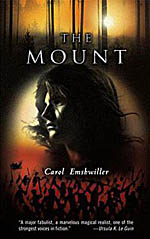
![]() Triseult
Triseult
9/3/2012
![]()
When I began reading this story of an alien race that has not just conquered us, but turned us into their personal mounts, I expected a heavy-handed metaphor about slavery and social dynamics. What I got instead was part allegory, but also a fully-realized SF world, complete with intricate mechanisms by which an alien invader managed to tame us as a species.
The most surprising and pleasant part of The Mount is how thorough the author is with her explanation of how humans could become mounts to an alien invader. This is not simply a matter of humans being treated as properties by an aliens; instead, we get to appreciate the kindness of the Hoots for Humanity, and how they revere humans' strength and dignity. Furthermore, many humans themselves are perfectly at ease with this status as mounts: the protagonist keeps yearning for the dignity and pride of being a good mount, and we get a sense that this domination is so complete and ancient that the slaves themselves accept their status. There's some clever post-colonial commentary in there, that's for sure. It also works as one of the most startling and original alien invasion stories I've read in recent memory.
Where the book falls apart is in Ms. Emshwiller's choice for her protagonist. Charley is a bland character, and a bit dumb to boot. A lot of things happen around him and he fails to capture and convey the complexity and importance of these events. For the most part, he's self-obsessed, constantly yearns to return to his prior status as a prized mount, and pretty dense when it comes to appreciating the conflicts around him.
I can understand why the author chose Charley as a protagonist. For sure, telling the story of Humanity's fate as mounts to superior alien beings should be made all the richer if we can appreciate it from the perspective of a dominated character. Unfortunately, no one else outside of the Hoots themselves wish for humans to remain in bondage. They can't appreciate Charley's situation, and neither can he understand why they yearn for freedom. What's frustrating is that whenever it feels like a character is about to explain things to Charley, that character becomes vague, clams up, or otherwise moves onto something else. It feels as if the writer tried to isolate her protagonist from revelation, for the sake of keeping his disillusion going.
And so, we're stuck with Charley whining his way through the tribulations of his father's people as they try to break the hold of the Hoots. Charley eventually begins to change, but the change is pretty abrupt and a bit too convenient. For the remainder of the story up to that point, we're stuck with Charley's indifference, and it seeps into the tale to the point where we barely care for Humanity's struggle.
Overall, I loved the setting, and the way Emshwiller articulated her world. The Hoots were a truly original and intriguing alien species. The ways in which the Hoots stay in control of Humanity are interesting and nuanced, and their attitude is startling and thought-provoking. But alas, the dramatic arc of the story is bogged down by a protagonist who deflates any attempt to care.